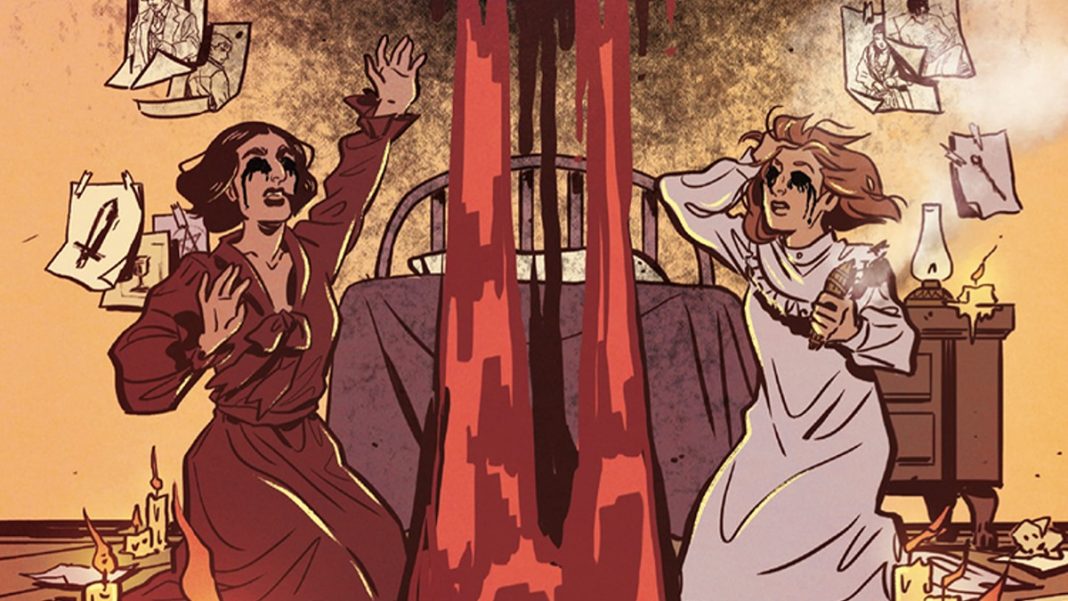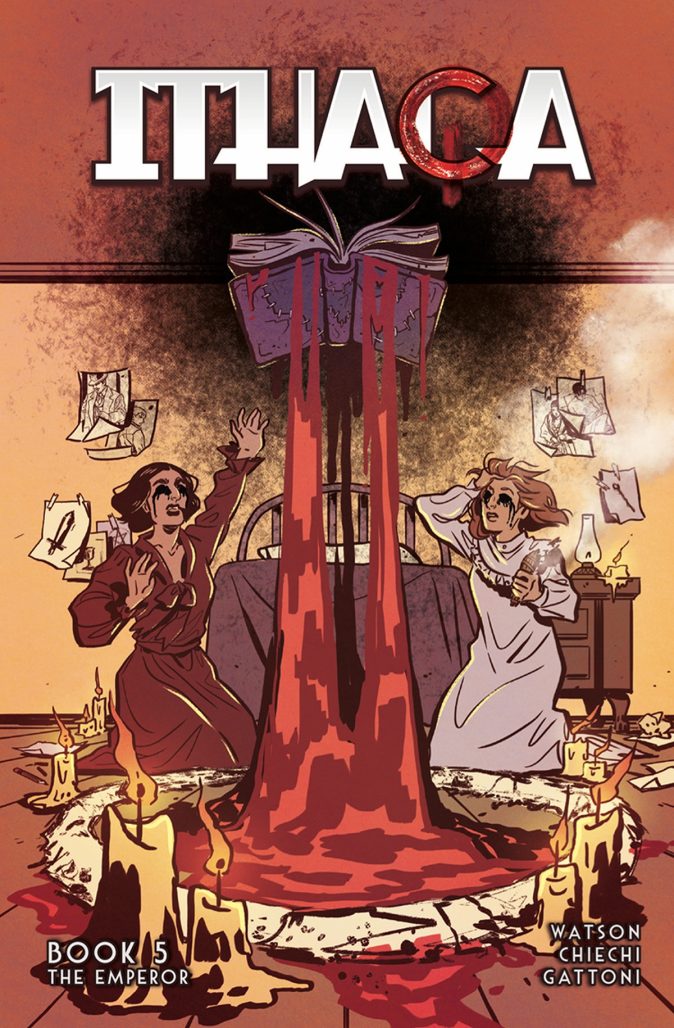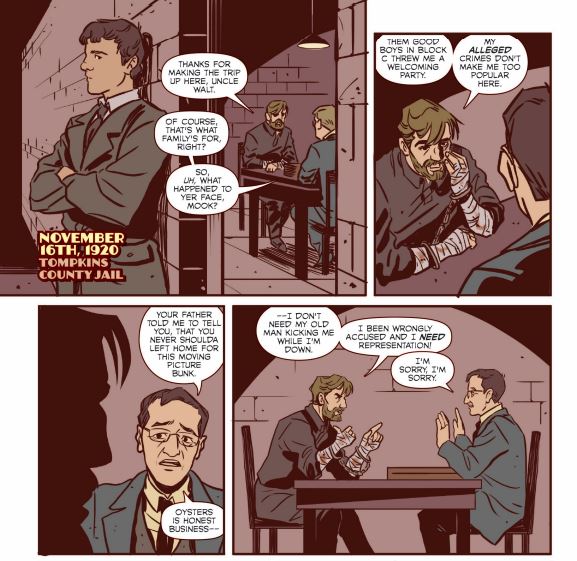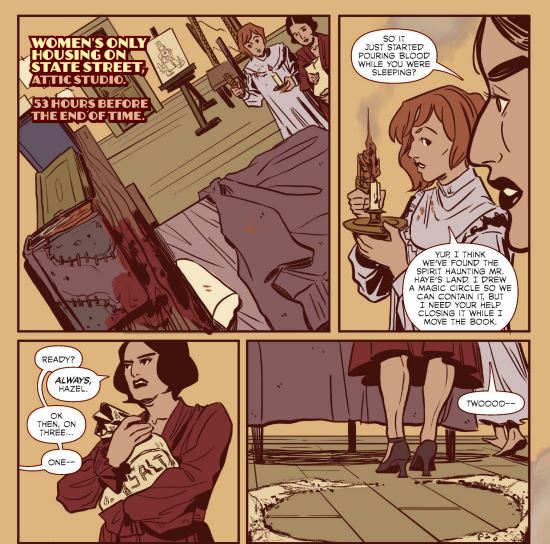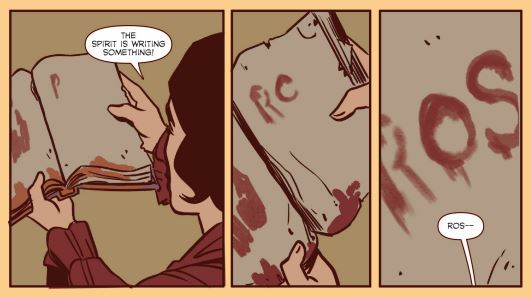Michael Watson and Theresa Chiechi taken the daunting road of funding and self-publishing each issue of their 13-part Lovecraftian horror comic Ithaqa via Kickstarter. Up to issue #5 as of the time of this writing, the book has earned a steady stream of support that rests not just on the creators’ innovative and complex approach to the Lovecraft mythos, but also on their ability to keep the comic’s online presence alive and kicking.
This is isn’t an easy thing to do, especially in today’s economy. But Watson and Chiechi have managed to achieve it by turning Ithaqa into a community-based experience that’s included Call of Cthulhu RPG livestream sessions (one of which I had the chance to participate in), a vibrant social media campaign that dives into the creative process, and smaller convention tabling with Ithaqa cosplay at the forefront. Essentially, like all good horror myths, Ithaqa has become its own world. And its creative voices have kept it fun, accessible, and playfully dark so that people can more freely give in to the pull of the horror adventure at the center of it.
Using Lovecraftian ideas and sensibilities to explore other time periods and concepts that don’t always get the attention they should within Cthulhian lore, Watson and Chiechi take to Ithaqa for a mystery set in the Roaring Twenties led by a formidable cast of female leads that delve into magic to pull back the veil on cosmic horror. The story surprises readers with multiversal arcs, psychedelic trips into other dimensions, and an involved sense of narrative that unravels more like a tabletop RPG than a classic Lovecraft story. The combination works wonders, and it proves that Lovecraftian horror has a lot more to give if we challenge its limits.
I had the chance to correspond with Michael Watson to talk his crowdfunding journey and lessons learned on keeping readers interested in the story as it releases one issue at a time.
RICARDO SERRANO: Your self-publishing trajectory with Ithaqa has allowed you to make the comic you want at your own pace. What have you learned about storytelling in this process, especially as the self-publishing part does mean the single issues take longer to come out?
MICHAEL WATSON: The biggest thing that has been reinforced for me is the importance of re-writes. Because I don’t have a boss or publisher breathing down my neck, I’ve been able to sit with some issues for over a year, mulling over solutions to plot holes that demand a lot of attention. Usually it only takes me a few weeks or months to write a 36 page issue, but #4 and #8 took 1-2 years respectively. That would never fly if I wasn’t publishing an independent comic. It does pay off though. I felt very proud when I watched “Dr. Strange and The Multiverse of Madness,” and I saw them falling for several time travel/multiversal pitfalls that Lisa (my editor) and I spent forever puzzling out, and ultimately avoiding.
SERRANO: What have been some of your successes in crowdfunding Ithaqa, especially in terms of getting readers to continue supporting the comic throughout the entire process?
WATSON: I’ve been very transparent about the whole process of creating a comic from scratch, from writing to illustrating to fundraising and publishing. I blog frequently on our Patreon and on a website called Peakd. The second my artist, Theresa, sends me even a scrap of paper with some basic thumbnails sketched out, I’m posting it and talking about it. I’ll discuss my process, my influences, and also my hardships. Anybody who was following my blog was well aware of my struggles with Issues 4 and 8. People are along for the writing journey with me, and get to hear me discuss each new strategy I’ve devised for breaking through the wall, and they eventually get to see me find the solutions that work. Readers seem to consider Issue 4 to be their favorite so far, so people got to watch me struggle and then make something truly special.
I’m also very active in the physical world in the City of Ithaca. We have a big comic book convention every Spring, Ithacon, where I table, sign comics, do panels every year. I’m also hitting the pavement at our local book/comic stores. At least once a season I’m doing an event, talking to fans, and drawing in new ones.
The Kickstarter campaigns themselves have also been very interactive for our readers. We always do raffles to get fans drawn into the comic, or turned into cultist characters in the world of Ithaqa. As you know, Ricky, Theresa and I like to live stream playing Call of Cthulhu as well. We really enjoy getting into silly adventures in the world of Ithaqa.
SERRANO: What are you excited for as the comic reaches the final stage of its cosmically twisty story? Any other Lovecraftian tricks you want to bring in in upcoming issues?
WATSON: This is actually the most exciting time for me in terms of the comic. We spent so many issues building our characters up, but keeping things grounded, but now we finally get to cut loose. Issue 4 was our big jump in supernatural shenanigans. We took Harvey and Rosie into “The Loom’ – a psychedelic multiversal space where Lovecraftian time spiders dwell. We also haven’t even turned the Lovecraft dials truly up to 11 yet. We raise the emotional and supernatural stakes with every issue up until the climax in #12. I love that, because it means every new issue that Theresa illustrates, I get to see something new and unhinged. In the later issues I start to weave in more explicit callbacks to the Lovecraft Mythos as well. Fans may want to reread “The Whisperer In Darkness” and “The Thing on The Doorstep.”
I’d like people to know that they can buy physical or digital copies of Issues 1-5 on our website, Issue 6 is being illustrated as we speak, and that all 13 issues have been written. I also upload a page of the comic a week onto Webtoons, so anyone who wants to read the first two issues for free, can get started over there! They can also follow us on Instagram @IthaqaComic.


